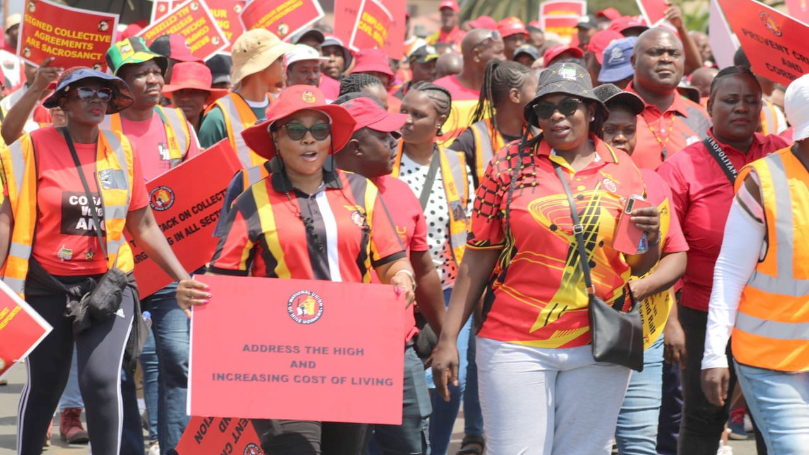
This article was earlier published by Liberation.
The commitment to promoting internationalism and fostering solidarity among workers on the African continent and worldwide is growing, in view of the fact that capitalist exploitation functions on a global scale which transcends geographical borders. Dikobé Ben Martins surveys recent geopolitical changes in Africa, from Morocco to South Africa.
Three and a half decades, since the demise and collapse of the Soviet Union and the end of the Cold War, alarmingly the world is witnessing the gathering of ominous dark clouds of a New Cold War.
America, it seems, is leading European countries to the precipice of wars with Russia and the People’s Republic of China.
The world is a dangerous place. Wars rage in Ukraine and Palestine. Gaza is the killing fields of Israel’s army.
On the African continent Burkina Faso, Mali and Niger have rumbled with the thunderclap of coup d’états to bring an end to France’s yoke of neocolonialism.
The commitment to promoting internationalism and fostering solidarity among workers on the African continent and worldwide is growing, in view of the fact that capitalist exploitation functions on a global scale which transcends geographical borders.
The Confederation of Sahel States has created an independent, democratic momentum and motive force that led to it splitting from the Economic Community of West African States [ECOWAS].
The Confederation was formed and is based on a mutual defence pact which was created on September 16, 2023, when ECOWAS threatened to intervene militarily to restore civilian rule in Niger.
The Confederation of Sahel States is opposed to France’s neocolonialism, and the relentless extraction of natural resources by foreign corporations which have perpetuated poverty, and resulted in the Confederation’s forfeiture of control over its natural resources.
More and more African countries are striving to gain or strengthen their sovereignty, self-sufficiency, and national and cultural identities.
Captain Ibrahim Tauore, the leader of Burkina Faso; Aboubakar Keita, the leader of Mali; and Abdourahamane Tchiani, the leader of Niger are soldiers imbued with a deep hatred and contempt for corrupt puppet leaders who were foisted on their peoples by France and kept in power by criminal intervention and mercenaries.
The Alliance of Sahel States’ leaders stand out as brave and capable leaders. We appreciate their full value and conviction, as examples to emulate that will inspire young men and women similar to them, to rise from the ranks of struggling peoples.
There is widespread condemnation of France’s unlawful recognition of Morocco’s sovereignty over Western Sahara, and Morocco’s relationship with Israel that enables Israel’s reactionary and corrupting access to African countries.
Progressive forces on the continent have also condemned the Israeli military and technological support to Morrocco, which is used against the liberation struggle of the Saharawi people.
Recognition of the inalienable right of the Saharawi people to struggle for their rights, self-determination, freedom, and independence is growing, as is progressive support for the revolutionary struggle of Polisario.
The United Nations’ MINURSO Mission and the African Union have been urged to speed up the long overdue Referendum on the Self-Determination of occupied Saharawi.
Kenya
The recent protests in Kenya were sparked by the Finance Bill 2024 which doubled VAT on petroleum products and on the mandatory housing levy. The Bill exacerbated economic and social injustices caused by neo-liberal policies imposed by the International Monetary Fund.
On July 19, 2024, a coalition of over twenty-eight progressive civil society organisations rose to protest against the injustices suffered by ordinary people.
Leftwing and progressive political parties and trade unions also came together to form a united front against the neoliberal policies of President William Ruto’s government.
The Kenyan people are struggling for a pro-people government that will prioritise freedom, land, and peace.
The current Kenyan struggle resonates with the history of anti-colonial and anti-neo-colonialism across Africa and the Global South.
The Republic of South Africa
The South African general elections were held on May 29, 2024 to elect a new National Assembly as well as provincial legislatures in the nine provinces. Support for the governing African National Congress (ANC) declined significantly to forty percent of votes cast. The ANC lost the parliamentary majority that it had held since the inaugural post-apartheid election in 1994.
The neo-liberal bourgeois Democratic Alliance (DA) won second place.
The uMkhonto we Sizwe Party, which snatched the name of the ANC’s liberation army and drew its membership heavily from disgruntled ANC members, came third. The demagogic Economic Freedom Fighters, came fourth.
Post the elections, the African National Congress, the Democratic Alliance (DA), the Inkatha Freedom Party, the Pan Africanist Congress and the Patriotic Alliance formed a Government of National Unity (GNU), which elected Cyril Ramaphosa the president of the ANC as the President of South Africa.
The South African Communist Party (SACP), an alliance partner of the ANC, has strongly condemned the African National Congress’ coalition with the neo-liberal Democratic Alliance, which has always as a matter of principle opposed ANC policies aimed at improving the lives of workers, the unemployed and the poor. The SACP argued that there were other political options open to the ANC, like that of a Minority Government, or a coalition with one or more of the other political parties beside the DA.
The ANC has expressed the view that it is the leading and majority party in the GNU and that coalitions and GNU’s, by their very nature, are not always constituted by ideologically aligned political parties, that sometimes it is far right and centre left parties that come together.
Time will tell how the new coalition arrangement will work but there is no doubt that in South Africa the class struggle against imperialism, neocolonialism, monopoly capital exploitation and oppression is as critical as ever.
Image: Workers in Limpopo came out in their number in the intense heat in support of the #COSATUNationalStrike by South African Communist Party (Facebook)


 Join Now
Join Now